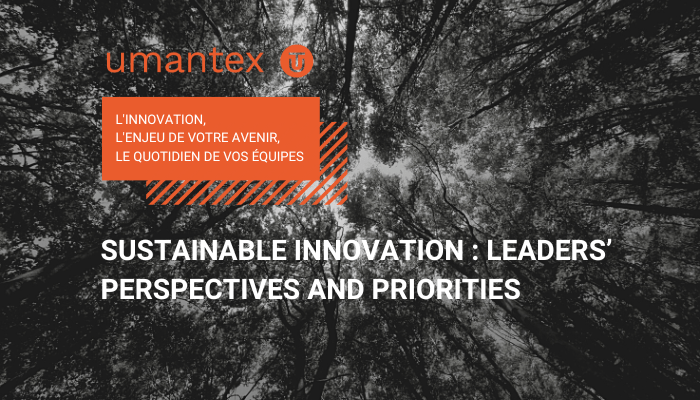What are the priorities of organization in terms of innovation?
Globally speaking, there is a real awakening on the issues of CSR and sustainable innovation issues. However there are strong differences between organizations.
In the priorities of organizations in terms of innovation, we observe that the part reserved for CSR is growing and is becoming increasingly important in companies’ innovation strategies, even though most of them are still business oriented.
However, it can no longer be denied that companies give importance and credit to the fact of integrating CSR into their innovation strategies and this has been reinforced.
Indeed one company out of two therefore attaches primary importance to CSR, 38% important, 14% not important,.
As far as innovation strategies are concerned, CSR has therefore taken a leading role, joining growth and improved performance to form a trio of key objectives in terms of innovation for companies. But the commitment is different depending on the sector. Without any doubts, the most involved sector in CSR is the food industry, due to the massive awareness of consumers to be a more responsible consumer
The current health crisis has a significant impact on the food industry in terms of product quality, production location, etc. Price is no longer the only criteria for consumers, CSR is becoming more and more involved in the consumption process.
Some sectors have understood this situation and are already trying to move towards sustainability such as the AEC industry. The Architecture, Engineering and Construction industry is demonstrating strong CSR performance by striking a good balance between new market acquisition, operational performance, and CSR as key innovation priorities.
Innovation in this sector is strongly influenced by environmental regulations and objectives of the Paris agreements on decarbonization. This priority is already illustrated through the fusion of sustainable innovation and technological innovation in projects such as Building information Modelling (BIM) or advanced technologies such as Automotive Internet of things (AIOT) which enable the construction of more eco-responsible buildings with less CO2 emissions.
On the other hand the public service sector and also Teaching and research sector show a lack of interest for CSR being more focused on business. We should therefore debate the role of innovation in this area.
Shouldn’t Innovation be a natural part of teaching and research and shouldn’t CSR and sustainability be the main driver to irradiate other sectors?
What is the leadership’s perspective?
Concerning departments, C-level and leadership focus primarily on market acquisition. But the question is : do top managers consider corporate social responsibility (CSR) as another source of external constraints?
Marketing and R&D Innovation departments consider their innovation practices as quite balanced and very inclusive even if most of the time organizations regard innovation as an existing business optimizer more than a game-changer.
But paradoxically, the CSR department perceives innovation primarily as an internal performance factor rather than an external competitiveness challenge to gain new markets. This could reveal that CSR departments are increasingly focusing on the organization’s core source of profitability and progressive exiting « green washing » activities. It could also demonstrate an integration of CSR as an essential component of organizations’ intangible asset.
However, there might be a recent evolution in the internal refocusing of the CSR department regarding innovation in certain organizations of this survey sample i.e. to scale-up sustainable innovation and to sharpen the assessment of impact. This will confirms an increasing trend of CSR in innovation priorities, which will be reinforced during the next 3 years.
In which area do innovation practices have the greatest impact?
So If we look in which area innovation practices have the greatest impact.
The pandemic explains most of the business focus of companies, but the study confirms that environmental and sustainability issues are considered. The environment holds a solid position on the impact of innovation after the business. If we add social issues to have a holistic approach, then sustainability reaches the same level of importance as business in terms of innovation priorities and we show an acceleration to drive towards sustainability.
The results highlight some differences across the different sectors related to their innovation impact:
Tech mainly focuses on business and specific environmental and social impacts, which can probably be interpreted as the rise of a new usage of technology. This sector knows that “Technology infrastructure is the backbone of the new digital economy” and that its challenge is to “Design new types of data centres that consume less energy to be compliant”.
Tech sector has the ambition to create and propose sustainable offers “Being compliant with regulations to meet customers’ requirements is now mandatory.” They are doubling their sustainability efforts to achieve their carbon neutral ambition. They plan to use new sources of energy production, implement energy efficiency programs or work on recyclable materials to contribute to reduce their CO2 emissions. There are a lot of challenges that the tech world will have to face in a sustainable world.
Oher sectors as defense, aeronautics or space sectors drive innovation towards business and management field and less towards environment. However they start to organize CSR to commit their team to rethink their global innovation.
The energy sector, on the other hand, shows a willingness to change things by implementing sustainability practices, but this implementation is not so much due to the huge willingness of this sector to support sustainability but by external factors which are
- strong digital transformation
- a positive impact on “clean” investments in the sector
When we talk about sustainable innovation, it is impossible not to mention the 2030 Agenda for Sustainable Development, adopted by all UN Member States in 2015, which is a shared vision of peace and prosperity for humanity and the planet, for today and for the future.
A Low knowledge of UN’s 17 SDG in innovation strategy
Within this framework, the study focused on the level of maturity and knowledge of the companies of the United Nations SDG . We see in that field that only 42% of them include them in their strategy, and 40% who do not.
Surprisingly, some respondents said that they never heard about UN’s Sustainable Development Goals and mostly are unaware of their existence in innovation strategy.
Which is quite paradoxical. One of the main reasons given is that their companies are not large enough to be involved or that it is too complex.
Despite these responses, the 17 UN’s Sustainability Development Goals (SDGs) remain a common roadmap for the 2030 Agenda for Sustainable Development and provide a blueprint for integrating sustainability and CSR into the organizations’ strategies.
Tech sector, food industry and Public sector show low score on SDGs integration. Otherwise Energy and AEC sectors explained that SGD define the best way to integrate sustainable commitments. Most of them confirm by joining United Nations Global Compact and partnering with R20 region of climate actions to tackle climate change.
They also highlight that nothing is possible without Top management support and without the team’ willingness to collaborate with external and internal stakeholders.
The rational for integrating CSR within the innovation strategy is primarily driven by company culture, follow by the improvement of awareness and branding.
The analysis confirms that the UN framework has become a key driver of innovation.
However, there is a lack of knowledge to integrate a systemic view of sustainability in some organizations and unfortunately, the communication strategies of some organizations are still tainted by greenwashing.
What are the main barriers to implement sustainable innovation and/or CSR principles in your organization?
For most of respondents, the main obstacles to implement or to merge sustainable innovation’s approaches and CSR principles are business constraints like resources, lake of time and profitability.
It means that we need to phase the integration of these topics in the business models to achieve a paradigm shift and find the right approach to coordinate R&D, which drives business innovation, and corporate level, which drives CSR principles.
In these domains, results highlight the issue of organizational complexity with a lack of ownership and leadership. It is difficult for organizations to evaluate the impact of each component of a CSR strategy for short- and long-term economic value.
There remains a lack of awareness of the costs of the impact. Some organizations consider the lack of profitability of low- emission products and services. Integrating the Carbon taxes in their current business model is a huge issue amounting to between USD 75 – USE 150/ton CO2. It’s time to establish CSR principles in order to reduce CO2 emissions and by the same time, carbon taxes, but above all to review the entire value chain of their business model.
Sustainable innovation was not considered as a priority for companies at the time of the study, even if it was acknowledged as a potential business driver but there are different smart ways to do sustainable and responsible innovation.
At that time Companies need to better understand that, we have to face new paradigms where the integration of CSR is more than ever mandatory due to the awareness of consumers and their willingness to consume differently.
COVID-19 pandemic was a tidal wave, which has accelerated and has changed the rules of the game across organizations. Most than ever.
First of all it makes sustainability the cornerstone of the innovation process. Some leaders are starting to recognize that sustainability means innovation. We can show a lot of sustainable innovations across multiple industries.
But the clock is ticking; all organizations need to speed up the integration of innovation sustainability and CSR into our business strategies to positively impact our society, our environment, our planet and tackle climate change.

